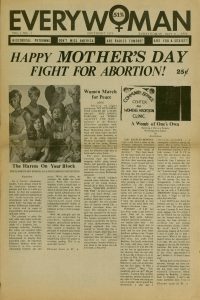Prior to 1973, nearly every state across the nation criminalized abortion except in instances to save the mother’s life. Approximately 10,000 women a year died from those laws. It was dangerous for women who sought an abortion during this time. Many could not afford one, or they obtained them illegally (MacLean, 24). Feminists during the Second Wave fought for reproductive freedom for women. The landmark court case, Roe v. Wade, overturned nationwide laws that banned abortion, and altered the definition of reproductive rights and privacy as previously understood.
In her testimony, “Hidden History: An Illegal Abortion,” Margaret Cerullo tells about her abortion experience from 1968 (Cerullo). Cerullo highlights the danger and shame from unwanted pregnancy she and other women faced during the time. Her story is one in which she had to make coded phone calls to various places in hopes they could help her. After that was unsuccessful, Cerullo found the number of a council who put her in contact with an illegal clinic in Towson, Maryland. They instructed her to bring $600 in small bills to pay for the procedure. This was a steep price for the time, equating to roughly $4,300 in value in 2018. On her way to the clinic, Cerullo stated, “For the first time, I understood something about what it meant to be a woman in this society– that the lives of women were not of value. And I realized, in an inchoate rage that is with me today as I recall this story, that in this society, because I had sex, someone thought I deserved to die” (Cerullo, 81).
 Sadly her story is not an isolated incident. Stories from women all over depict their experiences of reaching out and getting abortions. Those experiences took a significant emotional and physical toll on them. The first issue of Everywoman, a feminist periodical, contains a story similar to Margaret Cerullo’s about a girl named D and her experience in flying to California to get an abortion. The front cover of this issue calls for a “Fight for Abortion!” Many of the issues following this one contain similar messages, until the end of publication in 1972.
Sadly her story is not an isolated incident. Stories from women all over depict their experiences of reaching out and getting abortions. Those experiences took a significant emotional and physical toll on them. The first issue of Everywoman, a feminist periodical, contains a story similar to Margaret Cerullo’s about a girl named D and her experience in flying to California to get an abortion. The front cover of this issue calls for a “Fight for Abortion!” Many of the issues following this one contain similar messages, until the end of publication in 1972.

Supreme Court Building in Washington, D.C. Picture by McKenzie Stoker
Roe v. Wade, 410 U.S. 113, in 1973 changed the definition of reproductive privacy across the nation. In this landmark Supreme Court case, the Court held in a 7-2 decision that a woman’s right to an abortion is protected by the Fourteenth Amendment. Women were able to abort a fetus through the first trimester, and the decision set guidelines for state interests for limits in the second and third trimesters of pregnancy. This ruling overturned 46 state laws regarding reproductive privacy (United).
After the decision, women were free to choose if they wanted an abortion within the framework of the laws. That choice was no longer criminalized, and fewer women died due to unsafe abortions (Wright). While the decriminalization of abortion brought about legal and some social change, there was still a strong stigma attached to terminating a pregnancy, and women faced significant shame in doing so. Lucille Clifton’s poem, “the lost baby poem,” illustrates the difficulty of this choice. There is tension throughout the poem surrounding the choice of terminating her pregnancy. The mother thinks of her lost child with great sorrow, regret, and shame. A potential reason for undergoing an abortion is the mother’s poverty. The baby would have “been born into winter / in the year of the disconnected gas / and no car.” Without gas to heat the house in the dead of a Canadian winter and a car to get places, the mother might not have enough money to properly take care of the unborn child. Aside from a lack of money, the mother’s attention is focused on her other children, which could be another reason for terminating her pregnancy. “if i am ever less than a mountain / for your definite brothers and sisters / let the rivers pour over my head.” These three lines show the pain it took to end the pregnancy, but the mother’s difficult decision to abort the fetus would not be for nothing. She wants to be a good mother for her remaining children.

